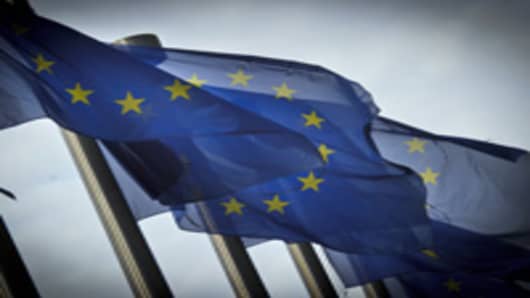To get the next loan installment, Greece is supposed to find 11.7 billion euros ($14.8 billion) in additional cuts in June. They will get a reprieve from the troika (the International Monetary Fund /the European Union/the European Central Bank ).
There are already reports that the new government will seek a two-year extension of the fiscal targets.
That's where it gets tricky: The EU is going to have to negotiate a new deal, and come up with more money to bridge the "financing gap." To do that, however, it will have to get approval from countries that are very much on the edge on this: Germany, the Netherlands, and Finland. There are elections in the Netherlands on Sept. 12 — will the government even be able to sign off on anything until then?
What Greece needs is what it is unlikely to get: official sector debt relief. That means the EU, the IMF, and European governments have got to write off a large part of that $400 billion in Greek debt, much of it held by the public sector.
2) The market is losing faith in the ability of politicians to address the problems. Look at the G20 summit. The only tangible goal is to raise $420 billion to expand the IMF bailout fund. That's it?
Don't worry: European Monetary Union 2.0 is coming. Really. The EU Summit June 28-29 will likely end with a mandate for the European Commission to draw up a "roadmap" to a banking and fiscal union. More importantly, they are supposed to lay out the legal and constitutional process by which we get there.
Elsewhere:
1) "Troika Considering 'Significant Changes' to Irish Bailout Terms": That's a headline this morning, indicating the troika is considering doubling the time Ireland has to pay back its bailout loan from 15 years to 30 years. Who gets hurt? The creditors.
2) French President Francois Hollande presents a package of growth initiatives to the EU, but now that his party has won a substantial majority in the elections what does he do? Hollande wants to pass a series of tax hikes and spending increases. You're joking, right?
3) The end of the quarter is coming and on the surface, it's been lousy so far: S&P 500 index down 4.6 percent for the quarter. But we're up almost 3 percent this month ... and the last week saw a significant rally. Plenty trying to play an end-of-quarter rally, but it’s complicated by the U.S. Federal Reserve announcement on Wednesday and, to a lesser extent, by the Russell annual rebalancing of its indexes on Friday.
—By CNBC’s Bob Pisani
_____________________________
Bookmark CNBC Data Pages:
_____________________________
Want updates whenever a Trader Talk blog is filed? Follow me on Twitter: twitter.com/BobPisani.
Questions? Comments? tradertalk@cnbc.com



